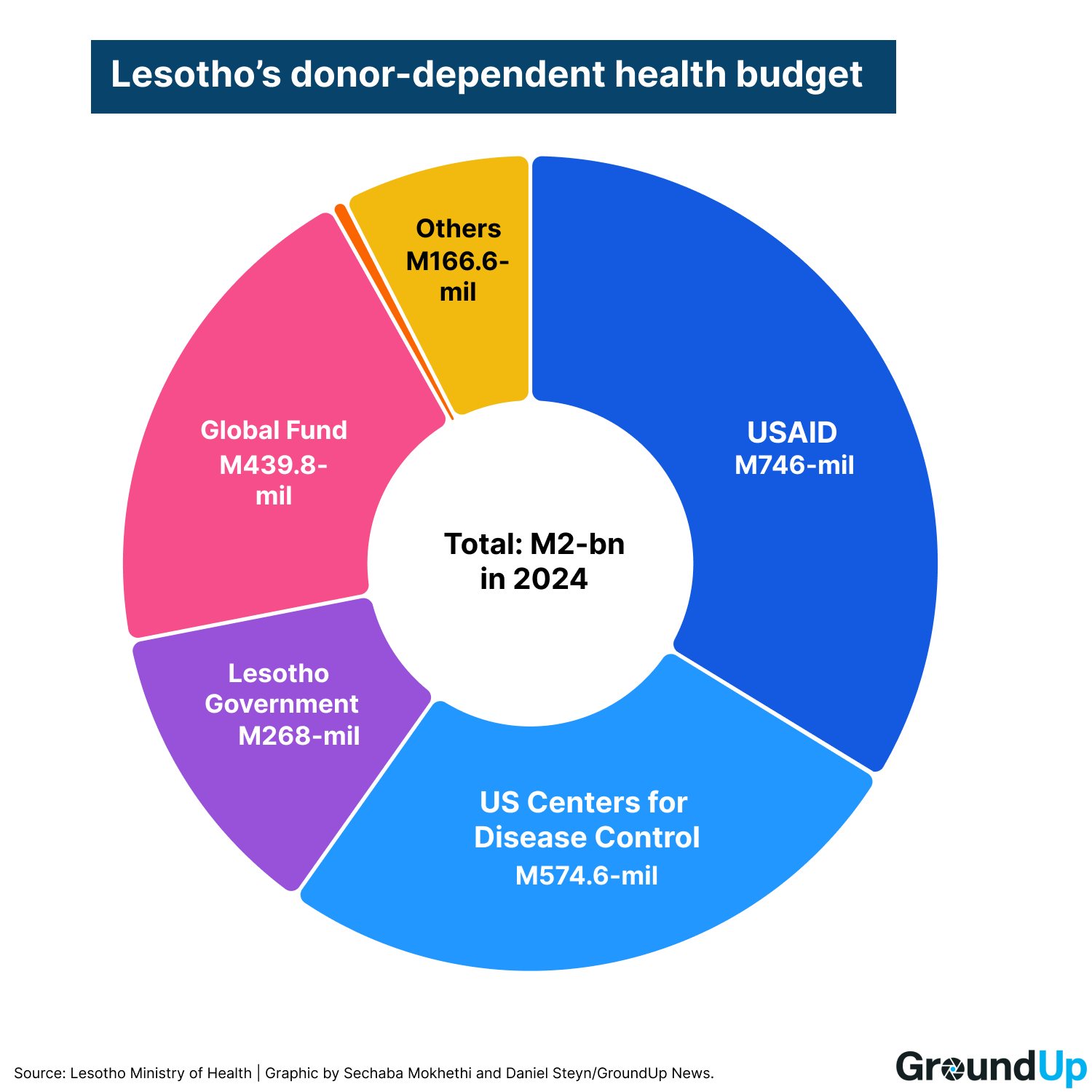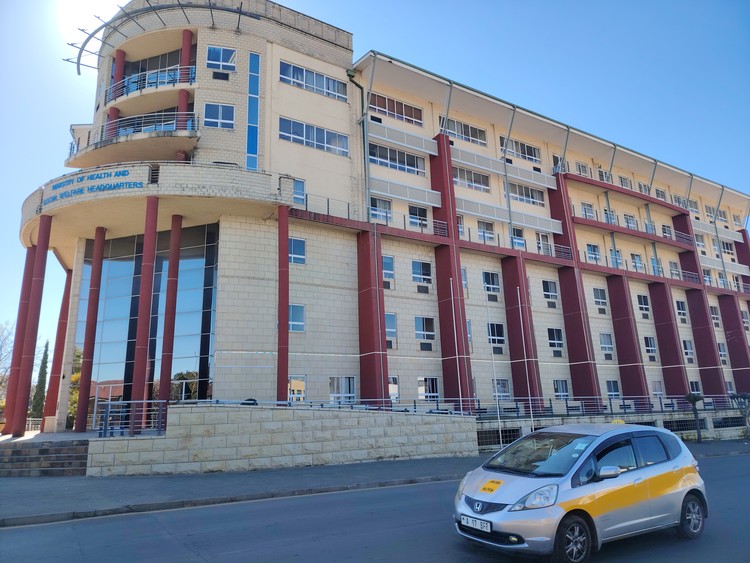Lesotho’s health system has been decimated by US funding cuts
60% of the country’s HIV counsellors have been laid off and the country’s TB programme is faltering
The Ministry of Health’s headquarters in Maseru, Lesotho. Photo: Sechaba Mokhethi
-
Despite previous assurances by Lesotho’s Minister of Health that the country’s HIV response will cope without US funding, senior officials say testing rates are dropping and prevention programmes have been gutted.
- Only 12% of Lesotho’s R2.2-billion health budget was government-funded last year. More than half of the budget came from USAID and the US Centre for Disease Control.
- With 93% of USAID funds cut this year, 652 frontline workers have had to be laid off.
- The country’s TB response is also faltering amid funding pauses. More than half of TB patients in the country also have HIV.
In March, Lesotho’s health minister Selibe Mochoborane boldly stated that the country’s HIV response will survive without support from the US.
The US model was “too expensive”, he said, and methods would have to be adapted “to align with our available resources.” He was confident that Lesotho would still reach its ambitious HIV prevention and treatment targets by 2030.
But senior health officials seemed less confident while presenting to Parliament’s portfolio committee on pandemics last week.
“When you cut community HIV prevention services, you inevitably increase new infections,” said Dr Tapiwa Turambiswa, who manages the Ministry of Health’s HIV/AIDS programmes.
PEPFAR distributes its funds in Lesotho via the United States Agency for International Development (USAID) and the US Center for Disease Control (CDC). Turambisa said that 93% of USAID’s funding and 6% from the CDC has been cut. In total, funding from USAID and the CDC has been slashed from about R1.4-billion to R600-million.
652 frontline workers have lost their jobs due to the cuts. The country has lost 60% of its counsellors who were providing HIV testing services, said Turambiswa. This will decrease the number of people tested, increasing the number of people unknowingly spreading the virus, he said.
In August last year, 11,702 people were tested but in April this year, only 9,054 were tested.
Dr Llang Mamma, the ministry’s national TB programme manager, said that many people diagnosed with TB are not being tested for HIV as per government policy, because of staff shortages.
“That means we will delay detection of new infections and related treatment,” Maama said.
Donor-dependent
Of the country’s M2.2-billion (one loti, M, is equal to one rand, R) health budget last year, only M278-million was funded by the government. Almost all of this is spent on antiretroviral medicines (ARVs).
The remainder of the health budget comes from international donors. This includes programmes for HIV prevention, treatment and other supportive services.
USAID and the CDC accounted for more than half the health budget last year, with the Global Fund contributing more than a fifth of the budget. PEPFAR is a major contributor to the Global Fund.

Terminated programmes
HIV prevention services have been the worst affected by US aid cuts. M212.4-million in USAID funds were earmarked for the SECURE project – an HIV prevention programme in ten districts that included condom distribution, voluntary medical male circumcision, and pre-exposure prophylaxis (PrEP), said Turambiswa.
A M168-million project called Bophelo Bo Botle, supporting more than 120,000 people on ARVs was also terminated, despite a waiver protecting PEPFAR’s life-saving programmes, said Turambiswa.
“This is a treatment and care project whereby the Elizabeth Glaser Pediatric AIDS Foundation deployed doctors, nurses, pharmacists, psychologists, counsellors, and the whole comprehensive list of human resources, putting them into ART clinics to see patients,” he said.
A M78-million project that was going to introduce long-acting PrEP injections, MOSAIC, was also ended.
M90-million for mental health and M77-million for primary healthcare has also been cut.
“We have also lost support for pharmacy regulation, surveillance activities like mortality and drug resistance monitoring, community-led monitoring, and all quality assurance systems,” Turambiswa said.
TB response falters
The funding crisis is also derailing Lesotho’s fight against TB, said Maama. While drugs and test kits are still available, outreach programmes have been put on hold.
The World Health Organisation’s Global TB Report 2024 estimates Lesotho’s TB incidence at 664 cases per 100,000 people. About half of TB patients are also HIV-positive.
Maama now warns that the situation is deteriorating. The Global Fund recently froze M19-million and suspended the full-scale rollout of its TB program pending a funding model re-evaluation. “We were scaling up community services to find every Mosotho with TB,” she said.
She added that the freeze likely means a permanent loss even though the Global Fund used the word “pause”. One suspended initiative, worth M4-million, was set to upgrade TB wards in Mohale’s Hoek and Leribe to serve as regional referral centres for drug-resistant TB.
Support independent journalism
Donate using Payfast

Don't miss out on the latest news
We respect your privacy, and promise we won't spam you.
Next: How history of “Kill the Boer” has been distorted
Previous: Closure of US-funded cancer clinic further burdens public hospitals
© 2025 GroundUp. This article is licensed under a Creative Commons Attribution-NoDerivatives 4.0 International License.
You may republish this article, so long as you credit the authors and GroundUp, and do not change the text. Please include a link back to the original article.
We put an invisible pixel in the article so that we can count traffic to republishers. All analytics tools are solely on our servers. We do not give our logs to any third party. Logs are deleted after two weeks. We do not use any IP address identifying information except to count regional traffic. We are solely interested in counting hits, not tracking users. If you republish, please do not delete the invisible pixel.

